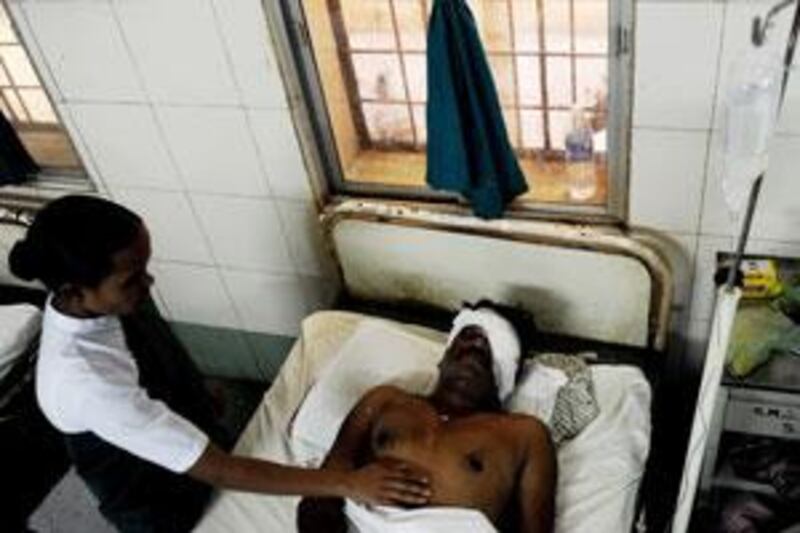MUMBAI // Tuesday's Maoist attack sent shockwaves across the country, drawing vows from officials to step up the much-publicised counter-offensive against the rebels, but also casting a cloud of criticism over the campaign.
The Maoists have thrust a "war" on the government, said P Chidambaram, India's home minister, after he visited Chhattisgarh state yesterday and met with families of the 76 slain policemen. He admitted that something in the military strategy had gone "very wrong", but he cautioned against any "knee-jerk" reaction to the attack, which was the deadliest in recent memory. He also said there would be no let up in the anti-Naxal counter-offensive, which was launched last year, while he ruled out bringing in the army. He hinted the air force might get involved in the operation.
"The goal of the Naxalites is to overthrow the established authority of the government through armed liberation struggle," Mr Chidambaram said. "We cannot, and we shall not, allow them to succeed in that goal." India's Maoist insurgents, also known as Naxalites - after Naxalbari in West Bengal, where they launched their armed rebellion in 1967 - have toeholds in 22 of India's 28 states, mainly in the impoverished rural and tribal pockets.
They were once dismissed by India's political class as a ragtag group of insurgents, but are now believed to be the country's "biggest internal security threat", according to the prime minister, Manmohan Singh. It is estimated that Naxalites have seized nearly a third of India's land mass across 223 districts, setting up their own parallel government in many of them. The rebels, who employ guerrilla tactics, have in recent years attacked police forces, hijacked trains and carried out beheadings.
But Tuesday's attack was one of the most shocking for its toll on security forces. At dawn, more than 1,000 rebels, armed with a sophisticated inventory of weapons, besieged the convoy of the Alpha company of the elite Central Reserve Police Force's (CRPF) 62 battalion in their signature guerrilla style. They opened fire indiscriminately, threw grenades and set off improvised explosive devices. Fleeing soldiers fell over the mines and booby traps that the rebels had laid beforehand on the escape routes. The entire Alpha company was wiped out.
Analysts, who are calling for a review of the government's counterinsurgency strategy, said the incident pointed to an intelligence failure, but also blamed the CRPF for fatal tactical errors. "Rules of jungle warfare were not followed," said Brig Basant Kumar Ponwar, the director of the Counter Terrorism and Jungle Warfare College in Chhattisgarh's Kanker district. In such an inhospitable, rocky and jungle-covered terrain, vehicles should not have been used, he said, to transport the policemen. Police were riding in mine-resistant vehicles, imported from South Africa, which were capable of withstanding 5kg to 7kg of explosives.
"Naxalites use nothing less than 10 to 80kg of explosives," Brig Ponwar said. "Their explosives can create massive craters in the ground." But the most shocking part of Tuesday's encounter is that there were "no casualties on the other side", he said. "No dead bodies of the rebels were recovered." Late last year, the government mobilised nearly 100,000 troops to launch Operation Green Hunt, a massive counter-offensive designed to stamp out the Maoists. The mission of the operation was to seize 40,000 sq km of rebel-controlled areas across seven states and capture "dead or alive" 20 top rebel leaders and 30 commanders who operate mainly in the remote jungles of Central India with 12,000 gun-totting rebels.
New Delhi provided all possible military assistance: armoured vehicles, laser-guided weaponry, mine-sweeping equipment and even aerial drones to track down the rebels' movements in the country's remote rural interiors. Before Tuesday's ambush, the home ministry had claimed that the military had taken great strides in the operation. Scores of rebel camps were destroyed and Maoist areas were steadily being recovered, it had said. Independent verification of those claims was nearly impossible because most Maoist-infested areas are inaccessible because of difficult terrain.
"The attack in Chhatisgarh is a direct consequence of the central government persisting with Operation Green Hunt," Gopal, a Naxal area commander in northern Chhatisgarh, told reporters."We have been surrounded by paramilitary battalions. They are setting fire to the forests and making adivasis [tribals] flee. In this situation, we have no other alternative." Although details about Operation Green Hunt are sketchy, it has provoked a shrill and polarised debate in India.
The government claims the Naxalites are recalcitrant militants who cannot be defeated through non-militarily means. Last year, the rebels blithely rejected government overtures to declare a 72-hour ceasefire and come to the negotiating table. In February, a Maoist spokesman said the rebels would agree to talk only if Pperation Green Hunt was halted, a demand the government was not willing to cede.
Through the Indian media, the spokesman asked the home minister to call on a mobile phone stolen from a kidnapped policeman. The mobile phone was not reachable after a few days. Many left-leaning intellectuals, who are staunchly opposed to Green Hunt, blamed the spread of Naxalism on widespread poverty in rural India. Naxalism, they said, feeds off the misery and anger of this disenfranchised tribal population bypassed by India's economic boom.
"Thousands of poor, innocent tribals caught up in the crossfire between rebels and the state will be killed in this operation," said Aparna Sen, an independent filmmaker who is vehemently opposed to the offensive. But, the recent attack is expected to harden the government's stance against the rebels. "This was a ghastly attack ? a senseless bloodbath," said Rajiv Pratap Rudy, a spokesman for the opposition nationalist Bharatiya Janta Party. "There is a war within and the entire country is affected by it. The entire nation is furious over the incidents. We have to hit them hard."
@Email:foreign.desk@thenational.ae





